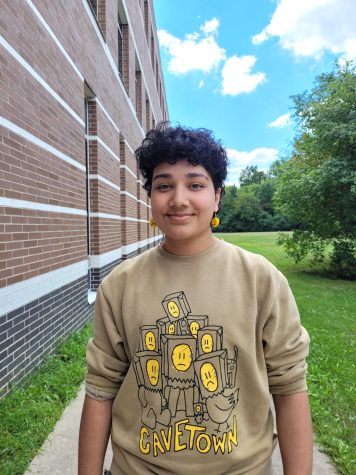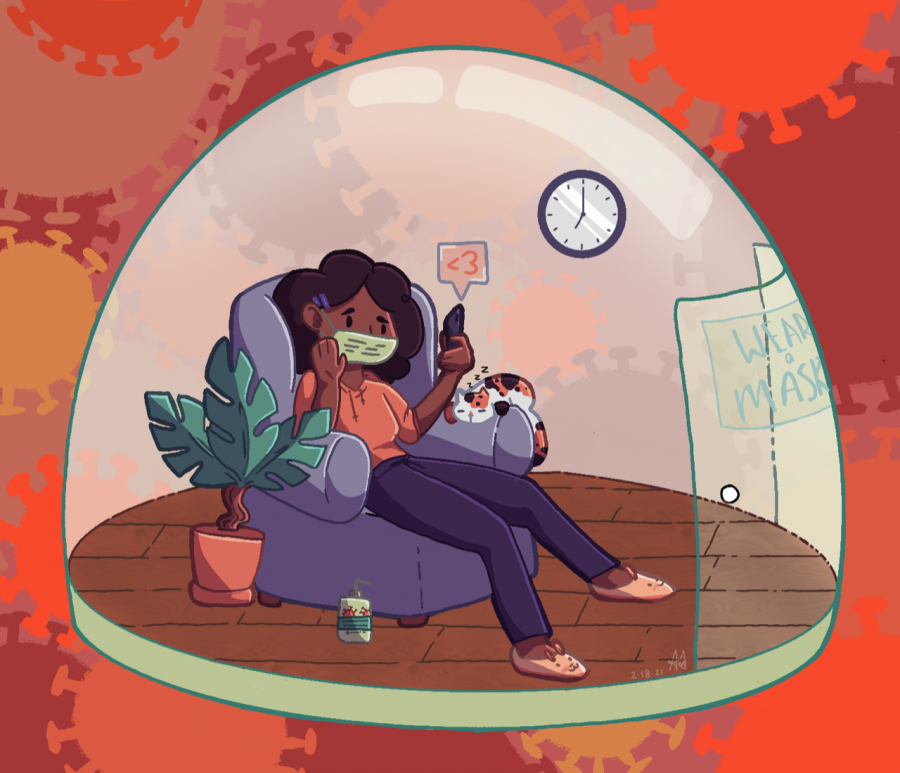Poor Connection, Try Again Later
Students facing a lack of social interaction during quarantine share suggestions for how to cope.
Online school has presented many students with a challenge most have never faced before. As the pandemic drags on, being isolated and kept away from friends and other loved ones for nearly a year now has been harmful to many students. Stuck at home all day, many teens are unable to achieve the independence and socialization that they need.
An article from the Washington Post presents chilling statistics from the Centers for Disease Control on the mental health of 12-24 year olds during this pandemic.
“26 percent of 18- to 24-year-olds reported having serious suicidal thoughts in the past 30 days,” the article said. “And mental health visits to emergency rooms by 12- to 17-year-olds increased 31 percent in 2020.”
A lack of socialization seems to be largely to blame for this dramatic increase in mental health issues. Unable to interact normally with friends, many young people often feel isolated.
The loneliness brought by the pandemic can easily leave teens feeling completely overwhelmed and alone. However, some have been able to turn this alone time into a blessing.
Sophomore Isabell Ku considers quarantine an opportunity to think about herself for a change.
“The fact that I’m not spending so much time figuring out people has given me a lot of time to work with myself, finding out what I want and who I want to be,” Ku said. “I think lots of people are spending this time to get to know themselves better.”
Representing many other introverts, Ku finds it easy to entertain herself with hobbies rather than relying on others and recommends this to anyone who is struggling with boredom and loneliness.
“A lot of people don’t really have hobbies, which leaves them at home like, ‘I don’t know what to do, I’m just going to scroll through TikTok all day,’” Ku said.
Exploring new hobbies can help many pass the time when things like friends and sports aren’t available the way they used to be, and even something relatively simple like reading or painting can be very beneficial.
Recently, hybrid learning has been reintroduced, bringing back some social interaction. While Ku has elected to stay home and doesn’t think that hybrid learning would help much to solve the issue of loneliness, Junior Karam Mawazini is an in-person learning student who thinks hybrid learning is one of the best things that could have happened to him.
“The first day I was in person, I remembered that this is where I discovered who I am, who my friends are, what I like to do, who I like to be around,” Mawazini said. “Being back in that learning environment was everything I needed.”
For Mawazini, reviving the social aspect of school, if only for a couple days a week, has dramatically improved his school experience and general state of mind.
Mawazini strongly encourages his peers to take the in-person learning option if possible.
“When you’re sitting behind a screen, you have no motivation to do anything… it’s so easy to not give effort,” Mawazini said. “The more we can contact each other, the better it is for our conscience.”
In his opinion, simply existing in a more engaging, social environment is a great solution to help combat loneliness and a lack of motivation.
Mawazini, like Ku, has been using quarantine to better himself.
“I’ve been getting into spirituality and meditating,” he said, “If you’re struggling with loneliness and a lack of interaction, focus on yourself. A lonely person will feel lonely in a room with hundreds of people.”
In a world where things like social media can create a hectic, constantly moving environment where it can be hard to catch a break, being alone for a while with the chance to take care of oneself can be seen as a long-needed breath of fresh air.
However, just because the pandemic is a chance to focus on self-care, it doesn’t mean that social interactions are lost. In fact, quarantine has given many people more ways to connect with their friends remotely than ever before.
“A lot of new resources to stay in touch have been opened to us,” Mawazini said, referencing things such as Teleparty, previously known as Netflix Party; online multiplayer games like Uno and Minecraft; and of course, the classic Zoom call.
Ku also emphasizes the importance of reaching out to friends.
“Make time to call your friends,” Ku said. “Go out of your way to seek them out, don’t wait for them… actively seeking companionship is really important.”
While COVID-19 has presented many unique challenges, many students have also found chances to make more meaningful connections.
“I think quarantine has given me an insight into compassion,” Mawazini said, remarking that he can relate to his friends more now that everyone has this shared experience.
Even as the pandemic continues to create physical divides, it’s important to remember that being alone doesn’t have to mean being lonely.
Your donation will support the student journalists of Troy High School - MI. Your contribution will allow us to print our work, purchase equipment and cover our annual website hosting costs.


